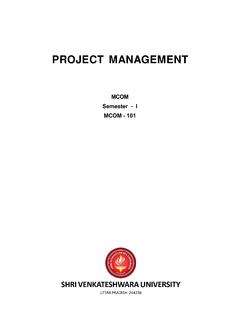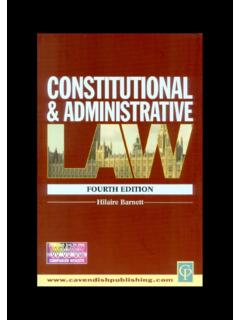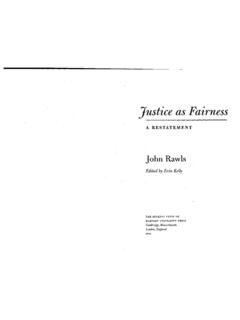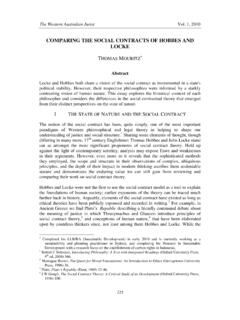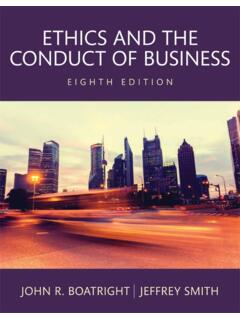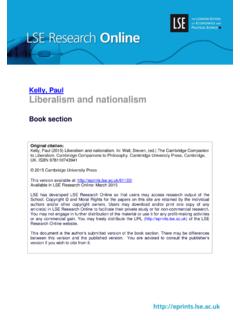Transcription of Basic Principles of Political Theory
1 Basic Principles OF. Political Theory . English Semester - I. BAG - 101. SHRI VENKATESHWARA UNIVERSITY. UTTAR PRADESH-244236. BOARD OF STUDIES. Prof (Dr.) Vice Chancellor Dr. Rajesh Singh Director Directorate of Distance Education SUBJECT EXPERT. Dr. , Professor Dr. Yogeshwar Prasad Sharma, Professor Dr. Uma Mishra, Asst. Professor COURSE CO-ORDINATOR. Mr. Shakeel Kausar Dy. Registrar Author Mr. Rukmana Meher, Senior Research Scholar, Center for West Asian Studies, School of International Studies, JNU, New Delhi Copyright Reserved, 2019. All rights reserved. No part of this publication which is material protected by this copyright notice may be reproduced or transmitted or utilized or stored in any form or by any means now known or hereinafter invented, electronic, digital or mechanical, including photocopying, scanning, recording or by any information storage or retrieval system, without prior written permission from the Publisher.
2 Information contained in this book has been published by VIKAS Publishing House Pvt. Ltd. and has been obtained by its Authors from sources believed to be reliable and are correct to the best of their knowledge. However, the Publisher and its Authors shall in no event be liable for any errors, omissions or damages arising out of use of this information and specifically disclaim any implied warranties or merchantability or fitness for any particular use. Vikas is the registered trademark of Vikas Publishing House Pvt. Ltd. VIKAS PUBLISHING HOUSE PVT LTD. E-28, Sector-8, Noida - 201301 (UP). Phone: 0120-4078900 Fax: 0120-4078999. Regd. Office: A-27, 2nd Floor, Mohan Co-operative Industrial Estate, New Delhi 1100 44.
3 Website: Email: SYLLABI-BOOK MAPPING TABLE. Basic Principles of Political Theory Syllabi Mapping in Book Group - A. Unit - I. Different Interpretations of Political Theory : Chapter 1: Different The Classical Tradition of Political Theory ; Importance and Interpretation of Political Theory Limitations of Classical Tradition (Pages 3-37);. Moves towards a Science of Politics Positivism and Chapter 2: Impact of Positivism Logical Positivism on Political Science Behaviouralism and Post Behaviouralism (Pages 39-74). Debate on the Decline'/ Revival' of Political Theory Impact of Positivism on Political Science Unit - II. Use of Rational Actors Models Public Choice Approach Influence of General SystemsTheory: Input Output Analysis (David Easton).
4 Structural Functionalism (Almond and Powell). Communication Model (Karl Duetsch). Group B. Unit - III. Contemporary Liberalism: Chapter 3: Contemporary Rawls Liberalism Nozick (Pages 75-111). Communitarianism Unit - IV. Marxist View of Science and Marxist Approach: Chapter 4: Marxist View of Analysis of Political Economy Structuralist and Marxist Science and Marxist Approach Neo Marxist Perspectives on Development: (Pages 113-140). Analysis of Mode of Production Key Debates Nature of State Theory of Relative Autonomy and Authoritarian Statism CONTENTS. INTRODUCTION. CHAPTER 1 DIFFERENT INTERPRETATION OF Political Theory 3-37. Introduction Unit Objectives Meaning of Political Theory The Classical Tradition of Political Theory Science of Politics-Positivism and Logical Positivism Positivism Logical Positivism or Neo-positivism Behaviouralism and Post-behaviouralism Behaviouralism Post-behaviouralism Decline and Revival of Political Theory Summary Key Terms Answers to Check Your Progress'.
5 Questions and Exercises CHAPTER 2 IMPACT OF POSITIVISM ON Political SCIENCE 39-74. Introduction Unit Objectives Use of Rational Actors Models Public Choice Approach Influence of General System Theory : Input-output Analysis (David Easton). Political Analysis Criticism Structural Functionalism (Almond and Powell). Prominent Theorists Criticism Communication Model (Karl Deutsch). Summary Key Terms Answers to Check Your Progress'. Questions and Exercises Further Reading CHAPTER 3 CONTEMPORARY LIBERALISM 75-111. Introduction Unit Objectives John Rawls The Role of justice ; The Subject of justice Why a social contract ? What is the Original Position (OP)? What is the Intuitive Idea Behind the OP Argument?
6 Robert Nozick Communitarianism The Debate Over the Self Summary Key Terms Answers to Check Your Progress'. Questions and Exercises Further Reading CHAPTER 4 MARXIST VIEW OF SCIENCE AND MARXIST APPROACH 113-140. Introduction Unit Objectives Marxist view of Science and Marxist Approach Analysis of Political Economy Marxist and Structuralist Structuralist The New Structuralism Economic Structuralism Criticism of Structuralist Theory Neo Marxist Perspectives on Development: Analysis of Mode of Production Key Debate Nature of State Theory of Relative Autonomy and Authoritarian Statism Summary Key Terms Answers to Check Your Progress'. Questions and Exercises Further Reading Introduction INTRODUCTION.
7 Politics plays a defining role in the society. It not only lays the foundation of our NOTES. social life but also is the building block of the civil society. It performs the legal and administrative functions of the society, protecting states from complete anarchy. This title, Basic Principles of Political Theory presents a comprehensive study of various Political theories and their interpretation. Unit 1 introduces the meaning of Political Theory , the classical tradition of Political Theory and the science of politics. It also, delves into the concept of behaviouralism and post-behaviouralism. Unit 2 analyses the role of positivism in Political science constituting the application of Rational Actors Model, Public Choice Approach, General System Theory and Structural Functionalism.
8 Unit 3 explores the different facets of contemporary liberalism, including the perspectives put forth by John Rawls and Robert Nozick. Unit 4 explains the Marxist approach to Political Theory , constituting of a thorough evaluation of the mode of production and nature of state. This book is written with the distance learning student in mind. It is presented in a user-friendly format and a clear, lucid language. Each Unit contains an Introduction and a list of Unit Objectives to prepare the student with an overview of the text. At the end of each unit is a list of Key Terms and a Summary, to aid in recollection. All units contain Questions and Exercises and strategically placed Check Your Progress' questions so that the student can keep track of what they have learnt.
9 Self-Instructional Material Different Interpretation UNIT 1 DIFFERENT of Political Theory INTERPRETATION OF. NOTES. Political Theory . Structure Introduction Unit Objectives Meaning of Political Theory The Classical Tradition of Political Theory Science of Politics-Positivism and Logical Positivism Positivism Logical Positivism or Neo-positivism Behaviouralism and Post-behaviouralism Behaviouralism Post-behaviouralism Decline and Revival of Political Theory Summary Key Terms Answers to Check Your Progress'. Questions and Exercises INTRODUCTION. In this unit, you will be acquainted with the meaning of Theory ' and Political Theory '. You will be made familiar with the concept of Political Theory and its different interpretations where you will study about the meaning, nature and significance of Political Theory .
10 The unit also discusses the genesis, development and significance of classical tradition of Political Theory . There will also be a discussion on science of politics and its two variants positivism and logical positivism. Further, you will also learn about the development of behaviouralism and post behaviouralism in the contemporary Political discourse. The unit will also deal with the discourse on the decline or revival of Political Theory . UNIT OBJECTIVES. After going through this unit, you will be able to: Define the meaning, nature and significance of Political Theory Explain the development and contributions of classical tradition to Political Theory Discuss the politics as a scientific subject and its variants Define the behaviouralism and post behaviouralism Interpret the discourse on the decline or revival of Political Theory Self-Instructional Material 3.


